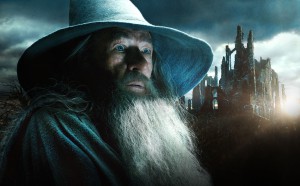 Over at Forbes.com, Scott Mendelson analyses the cost of The Hobbit movie trilogy, and why he believes that even at a cost of $561 million USD (with some post-production and marketing expenses still to come), it’s a bargain for the studios.
Over at Forbes.com, Scott Mendelson analyses the cost of The Hobbit movie trilogy, and why he believes that even at a cost of $561 million USD (with some post-production and marketing expenses still to come), it’s a bargain for the studios.
Imagine you’re a studio executive and you had the opportunity to spend $200 million a pop on three films in a trilogy that was all-but-guaranteed to earn $800-$1 billion at the worldwide box office per-installment.
You’d probably agree in a heartbeat and plan how to spend your bonus. So when you read about the “shocking” news [Demosthenes: I didn’t think the news was that shocking, frankly] from Variety that Peter Jackson’s Hobbit trilogy has thus far cost $561 million, don’t be too alarmed. All-told, it’s actually a pretty smart investment.
First of all, ten years of inflation accounts for at least a heavy portion of the cost difference (arguably 1/3), as does resigning old talent, paying Peter Jackson and company, plus the various new and expensive technological advances (like shooting in 3D and 48fps) and special effects toys.
Second of all, all three Hobbit films have been shot already, meaning that the only extra costs from here-on-out will be post-production and any additional footage that Warner Bros. chooses to pay for. Second of all [sic], the idea that the Hobbit trilogy, just two films in, has cost twice what The Lord of the Rings trilogy cost isn’t quite accurate, at least not yet.
The number being thrown around for the Lord of the Rings series is $281 million, or $94 million per-film. Both of the sequels, The Two Towers and Return of the King cost well above that $94 million price-tag. That $94m per-film figure comes from the amount allotted in the original New Line Cinema deal which involved shooting and post-production for all three films at one time.
But once Lord of the Rings: Fellowship of the Ring earned $869m worldwide, New Line allowed Peter Jackson to go back and tinker with and shoot more footage for the yet-unreleased The Two Towers, and again with Return of the King. That late-addition sequence of Orlando Bloom taking down an elephant in Return of the King wasn’t free. Official figures are hard to come by, but Return of the King allegedly came in at around $150m by the end thanks to, among other things, the furious race to finish the film on time.


